Customs
Who Is Afraid Of Transparency In Customs’ Operations?

Timi Bomodi
On September 26, 2021, members of Freight Forwarding Associations and Customs Licensed agents, including executives and members of thE Association of Nigeria Licensed Customs Agents(ANLCA), National Association of Government Approved Freight Forwarders(NAGAFF) and three other associations held a meeting at a popular hotel in Apapa, Lagos.
Among other things they were reported to have complained about was an intended hike in license fees, arbitrary increases in Nigeria Customs Service duty, hikes in the values of Pre-Arrival Assessment Reports(PAAR) issued to importers, the conduct of Valuation Officers, uncertainty or inconsistencies in tariff classifications for certain goods, frequent alerts, and the illogic of government giving revenue targets to Customs, especially in an era of trade facilitation.
Again on October 5th, 2021, and in response to the invitation of the House of Representatives Committee on Customs, ANLCA was quoted to have said that “the present Customs Management is not interested in professionalism and trade facilitation, but to circumvent all processes for revenue generation”.
The Nigeria Customs recognises and acknowledges the rights of Nigerians to freely organise, assemble and associate for the purpose of articulating group goals, visions, and objectives.
The NCS also acknowledges truth as the ultimate instrument which can free the maritime industry from the shackles of deceit and liberate our economy from the trenchant actions of those committed to sabotaging our efforts.
This is why it has become imperative to correct the numerous misrepresentations about the NCS contained in both their press release and the presentation made before the House Committee on Customs.
These recent outbursts and accusations do not come as a surprise.
In truth, Nigerians are not fooled by the current cavalier attitude of certain persons who for far too long, had an entrenched culture of opacity and disrespect for laws, regulations, rules, and procedures when it comes to making proper declarations for the purpose of paying correct government duties and taxes. Understanding their antecedents will throw more light on their recent ‘crusade’ against the current management of NCS.
Some executive members of these associations have long abandoned their responsibilities in entrenching professionalism among their colleagues.
They have forgotten their oath of honesty in their dealings with the government and have taken to the pursuit of power for personal aggrandizement. They have attempted to use their positions to procure favours for themselves and their companies.
When confronted with the force of reason, they have resorted to threats and blackmail . Incapable of articulating their positions in reference to our books of laws, they have resorted to intimidation, and have even facilitated physical attacks on our officers.
In all these situations, officers of the Nigeria Customs have refused to be cowed. We have remained resolute in our commitment to the government by towing the path of honor.
Our achievements in revenue collection and anti-smuggling speak for themselves. The current management under the watch of the Comptroller General, Colonel Hameed Ibrahim Ali (retd), has shown exceptional leadership in this regard.
Our systems have been put through a good number of iterations. From ASYCUDA I, II, & ++, to NICIS I & II. We are currently on the verge of migrating to E-Customs, which will herald a new epoch, as all Customs activities will be electronically enabled.
The simplification, harmonisation, and automation of Customs activities are in tandem with WCO and WTO objectives for trade facilitation. Our commitment to this reality is unshakeable and our actions bear testament to our resolve.
We also note that trade compliance is a sine qua non for trade facilitation. Where the level of compliance is low, the level of control becomes high.
Some agents and Customs brokers have taken abnormalities as rights. They have assumed the role of activists, encouraging illegal behaviours.
This cannot be accepted as no government agency worth its name will allow itself to be swayed by the whims and caprices of those whose actions they are supposed to superintend. Indeed it will be a complete dereliction of duty if we succumb to these and other attempts.
The disposition of NCS management is neither authoritarian nor archaic. Its actions have always been guided by federal government policy decisions in line with international agreements and conventions on trade.
Contrary to their claims, there has been no attempt to arbitrarily increase the license fee of Customs Licensed Agents. It is important to note that the fees payable by Customs Licensed agents are as approved by law outlined in section 156 of CEMA as amended. The only recourse to a revision in fees can only be as dictated to by extant laws.
Arbitrary increase in Customs duty.
There are two main avenues for the adjustment of duty payable to the government that a Customs officer can legally activate.
Where the transaction value declared for an item is questionable and where the classification of the item is wrong.
The former refers to the declared CIF value, while the latter concerns the HS code for that item.
Part II of the Common External Tariff prescribes ‘General Rules for the interpretation of the Harmonised System’.
There are six rules in total and they provide clear, unambiguous guidelines for the classification of all goods under the CET. These rules are not subject to the interpretation of Customs officers alone as they are captured in simple English for the enlightenment of all persons equipped with the proper understanding of that language.
In addition to the interpretative rules are chapter headings and the explanatory notes which are designed to further highlight grey areas both of inclusions and exclusions as deemed appropriate for classification purposes.
The issue of value has also been comprehensively addressed in the WTO Agreement for Customs value adopted in Article VII of General Agreement on Trade and Tariffs, 1994.
This agreement provides a Customs Valuation method primarily based on the transaction value of the imported goods, also known as either the price ACTUALLY PAID or PAYABLE for the goods when sold for export to the country of importation.
In addition to the transaction value, WTO prescribes five other methods that can be applied successively. So the transaction value is followed by:
The transaction value of identical goods
The transaction value of similar goods
The deductive value method
The computed value method
The fall-back method.
In applying these rules for Customs valuation, the Service has noticed frequent attempts by importers, and, or their agents to falsify transaction values in order to evade the payment of correct duties.
Their insistence on uniform values for cars of the same make and manufacture is at best illogical when we agree that there are no uniform purchase prices, especially for cars from diverse locations.
A true declaration of the purchase value for cars should suffice, but agents have been known to deliberately mislead importers, by promising them lower duties even when they’ve been furnished with the correct information. Competition among themselves for customers has itself become inimical to honest declarations for tax purposes.
Freight, being an important consideration for assessing value, needs to be highlighted.
Indeed in recent times, there have been sharp increases in shipping costs across the globe occasioned by the effects of the pandemic refs:https://www.wsj.com/
The above links from Reuters, Wall Street Journal, and others can be easily verified.
The cost of freight alone is one out of three components which when added up, defines the value for duty.
The others are the cost of the product itself and the insurance payable for the goods in transit, otherwise known as the CIF value.
Where the value of the goods remains constant, but the freight rate changes, it will have an effect on the total CIF value of the goods assessed for duty.
In this case, the transaction value must be a true representation of the actual monetary component of the exchange.
In addition to this is the increase in the exchange rate. Where all other components of value remain constant, the exchange rate alone can trigger increases in value for duty.
It is, therefore, curious to observe individuals insisting on retaining the same historical values contrary to abundant current evidence.
What the Nigeria Customs Service has been inundated with are fictional representations of this monetary component which bear no resemblances to present realities. In truth, a good number of Customs agents and importers have been connected with this unwholesome practice.
Even the agents themselves cannot recognise the obvious contradictions in their statements. In one breath, they demand uniform values for cars but insist on totally different standards for other commodities.
There are no benchmarks for costs, values, or duty. However, when agents resort to cooking up invoices with the intention of evading duty, we are also duty-bound to adjust those values using the WTO Agreement on Customs Valuation, to reflect reality.
Where there is honesty in intention and action, the NCS can only reciprocate in good faith.
We live in a world where authenticating documents submitted for the validation of Customs has been made easy by technology.
The NCS has at its disposal the historical records of all imports/exports, importers/exporters, and a comprehensive index of values submitted by importers themselves.
The Service has numerous resources at its disposal for the verification, authentication, and adjustment of submitted data.
The same agents develop selective amnesia when confronted with the historical data of their importers within defined periods as cross-referenced from our system
We understand the frustrations of some of these agents as reports reaching Customs Headquarters indicate a radical change in the trajectory of business practices at our ports and borders.
This penchant for cutting corners as exemplified in false declarations and illegal deductions in Customs values is constantly checkmated by diligent officers intent on facilitating legitimate trade only.
So their anger is not for the number of alerts in the system but for being stopped by it. With the introduction of artificial intelligence and machine learning, more loopholes in the system will be identified and plugged.
We hope when this happens, they will attend anger management classes to save themselves the cost of managing their health.
As agents of the government, we can only live to the billings and briefs issued to us by our supervising ministry. Revenue collection, being one of our duties, is one to which we are wholly committed as attested to by our groundbreaking achievements in current and previous years.
We owe no organisation any explanation in our commitment to collecting revenue for the government. Our risk management protocols are determined by the strategic needs of the Service.
Our risk management techniques have been quite effective as evidenced in duty recoveries, and landmark seizures.
The activities of FOU and other intervention units of the Service are all part of the same risk management architecture. Officers who were found to be complicit in aiding the illegal activities of agents have been shown the way out.
Others with more grievous offences have been prosecuted in the courts.
The recent installation of scanners at a few of our ports will address the challenge of physical examination of goods and we look forward to their full engagement as it will no doubt help to facilitate trade.
We are also mindful of the impact our actions can have on legitimate traders, that is why we have provided avenues for the expedited clearance of goods under the fast track and other facilitative channels for businesses with unblemished records.
Often when disputes on classification and, or value arise following examination, a lot of time is wasted on baseless arguments.
Because most agents are not grounded in the rudiments of the Common External Tariff, and other books of instructions, they tend to use bargaining as a tool for resolving disputes, when all they need do is make superior submissions by referring to relevant books of authority.
Meanwhile, the system has provided outlets that allow for goods to be released under bank indemnity while the issues in dispute are being resolved. This mechanism is entrenched in the Post Clearance Audit department.
The Service takes serious exceptions to attempts by individuals or associations to intimidate or blackmail its officers in the course of their official functions.
While complaints and feedback are encouraged from agents and other members of the public, we reiterate our right to determine for ourselves frameworks for effective and efficient performances within the ambit of the law and executive orders.
The security situation in the country demands a dynamic approach to effective border management. The deployment of our assets is as dictated by intelligence and the risk profiling mechanisms of the Service. Those without skeletons in their cupboards have absolutely no reason to be afraid.
Finally, the NCS awaits the success of their recommendations to the government regarding revenue targets to Customs, so we can concentrate on trade facilitation and anti-smuggling activities alone. As always, our resolve for fulfilling our mandate is matched only with our determination for success and we remain totally focussed in this regard.
Bomodi is the Deputy National Public Relations Officer of the Nigeria Customs Service.
Customs
Relief as Customs grants January 31st, 2026 extension for fast track operators to migrate to AEO

Customs
Again, Customs, NDLEA Collabo intercepts 2,374 packages of Canadian Loud at Apapa Port

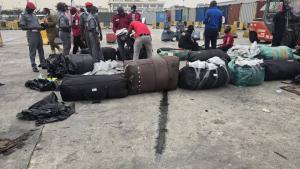
Customs
Comptroller Aliyu vows to sustain onslaught on smugglers as he assumes duties at FOU A

-
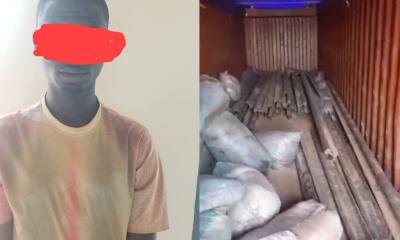
 Headlines2 months ago
Headlines2 months agoNRC police tracks down mastermind of railway vandalism in Kaduna
-
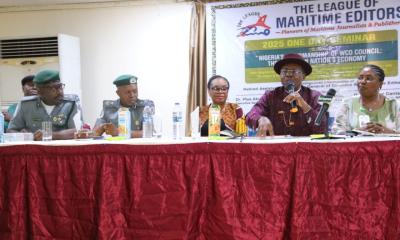
 Customs3 months ago
Customs3 months agoBeyond euphoria of WCO chairmanship: Stakeholders urge Nigeria to translate global Customs ascendency to reformation of Port industry
-
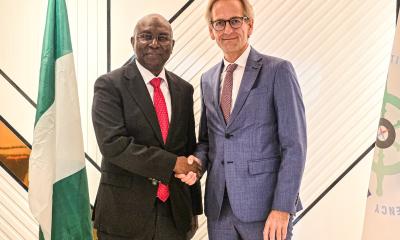
 Headlines2 months ago
Headlines2 months agoDenmark, Nigeria seek new areas of collaboration on maritime development
-

 Headlines4 weeks ago
Headlines4 weeks agoEx-NIWA boss, Oyebamiji, emerges most media-friendly CEO in maritime industry
-
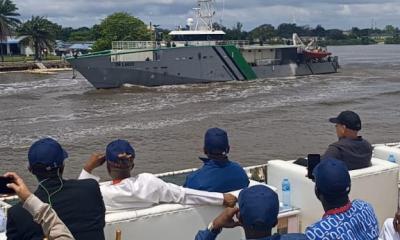
 Headlines3 months ago
Headlines3 months agoNigeria dazzles Dominguez, IMO scribe, with practical demonstration of deep blue assets capabilities.
-
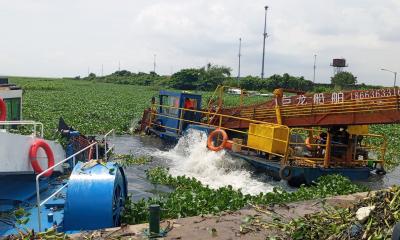
 Headlines2 months ago
Headlines2 months agoWater Hyacinth: An imported invasive aquatic menace NIWA is determined to fight in Nigeria

